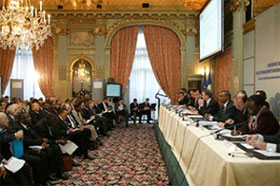For many years, the international community has been looking for new tools to ensure sustainable financing for development and the fight against hunger and poverty. In this spirit, Brazil, Chile, France, Norway and the United Kingdom have taken the initiative in creating UNITAID, an international drug purchase facility, which will help scale up access to drugs and diagnostics to fight AIDS, malaria and tuberculosis for people who need them most in developing countries. This new initiative is funded primarily by innovative financing mechanisms such as the tax contribution on air tickets.
UNITAID was officially launched on Tuesday 19 September on the day of the opening of the 61st session of the General Assembly of the United Nations. The event was opened with a statement by UN Secretary-General Kofi Annan, followed by a series of statements by Brazilian President Luiz Inacio Lula da Silva, French President Jacques Chirac, Norwegian Prime Minister Jens Stolenberg, Chilean Foreign Minister Alejandro Foxley Rioseco and British Minister for Development Gareth Thomas. Congolese President Sassou N’GUESSO spoke in his capacity as Chairman of the African Union.
“UNITAID is a model of its kind for many reasons. It is an approach that can be made to work rapidly. It is flexible, in that more countries can easily join the original members. And it is a lean mechanism which complements the existing global architecture for health, inside and outside the UN system,” said the UN Secretary General at the opening.
UNITAID is the culmination of long efforts on the part of the international community to mobilize a portion of resources generated by globalization to benefit development.
In 2004, over a hundred countries acceded to the New York Declaration on Action against Hunger and Poverty and 79 countries endorsed the Declaration on Innovative Sources of Financing for Development that was adopted on 14 September 2005 at the United Nations in New York.
The Paris Conference, held on 28 February and 1 March 2006, resulted in the establishment of a pilot group of 44 countries that committed to work on implementing such financing. It was at the end of the Paris Conference that France proposed to create the international drug purchase facility.
“New innovative sources of financing are absolutely necessary,” said UNAIDS Executive Director Dr. Peter Piot on the occasion of the Paris meeting. “The demand for ARVs will constantly rise in the next few years. More and more people will get sick and more and more people will know they have HIV. That’s why it’s so important that we develop long term sustainable funding mechanisms which will allow us to continue treating people in 20 or 40 years,” he said.
At the High Level Meeting on AIDS that took place at the UN Headquarters in New York on 2 June 2006, Brazil, Chile, France and Norway drafted a Joint Declaration on UNITAID outlining its mission, key principles and objectives. Since then, the founding countries and partner organizations have identified priority activities for each disease and determined the way in which UNITAID is to operate.
As of today, 19 of the 44 pilot group countries have taken initial steps to introduce an air-ticket solidarity levy: Brazil, Chile, Cambodia, Cameroon, Congo, Côte d’Ivoire, Cyprus, France, Gabon, Guinea, Jordan, Luxembourg, Madagascar, Mauritius, Mali, Nicaragua, Norway, South Korea and the United Kingdom.
Chile, Côte d’Ivoire, France, Gabon and Mauritius are already implementing a voluntary contribution mechanism. Other countries are preparing to join the UNITAID effort.
The United Nations system is working closely with UNITAID to support the initiative as it moves forward. UNAIDS’ Cosponsor the World Health Organization will host the Fund and the Secretariat of UNITAID.
At its last meeting in June 2006, UNAIDS’ governing body expressed its support for UNITAID as an example of innovative financing. UNAIDS has provided advice and support throughout the conception and development of the initiative and will continue to work with UNITAID, particularly on facilitating relations within the UN system.
Related links
Read the Secretary General’s opening statement
Read the document describing the UNITAID initiative
Visit the UNITAID web site
WHO statement: WHO welcomes launch of UNITAID
February 2006: Feature story - ‘Innovative AIDS funding takes off’






